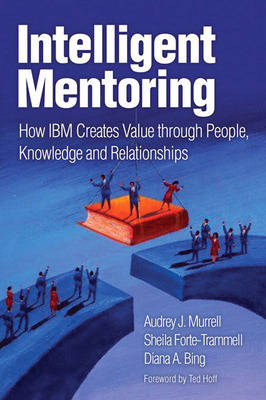
Intelligent Mentoring
IBM Press (Verlag)
978-0-13-713084-9 (ISBN)
- Titel ist leider vergriffen;
keine Neuauflage - Artikel merken
Techniques and lessons from IBM’s world-class mentoring programs—for every business and HR leader, strategist, Chief Learning Officer, consultant, trainer, and scholar
“A crucial part of my job is to help develop and retain the more than 200,000 members of IBM’s global technical community. Over the years, I have found that the true spirit of any organization is its people, and unique, world-class mentoring programs play a crucial role in their success. What I really like about Intelligent Mentoring is that it is not an academic treatise on the theory of mentoring, but a series of practical solutions that can be used by virtually any organization to gain productivity, increase retention, and improve bottom-line results.”
—Nick Donofrio, Executive Vice President, Innovation and Technology, IBM Corporation
“We have known about the importance of mentoring in developing people for decades. Yet few organizations have successfully leveraged it as part of their HR strategy. IBM is one of those companies. Intelligent Mentoringis about more than the mentoring initiative successfully implemented at IBM. It is a guide for how companies can leverage mentoring in a way that aligns with company strategy and supports organizational and individual development. It is a must-read for any executive considering a mentoring initiative as part of the firm’s HR strategy. IBM’s mentoring effort combined the best of what we know from mentoring research, career development theory, and change management to create a highly successful effort. There is much here for practitioners and scholars to learn.”
—David A. Thomas, Ph.D., Naylor Fitzhugh Professor of Business Administration, Harvard Business School
“Performance is the ultimate driver of this company. Even back in our earliest days, one of the keys to IBM’s greatness was performance, along with top-notch technology. Since arriving at IBM in 2000, my goal has been to identify, develop, train, reward, and retain high-performing people, and one of the best ways to support these high performers is through mentoring. I believe that Intelligent Mentoringhas done a phenomenal job of capturing the innovative and varied mentoring initiatives that IBM has used over the years. The authors really take you inside the company and show how mentoring has helped IBM preserve its corporate culture by passing on knowledge, not only between generations, but in all directions throughout our global community. This book is a must-read for anyone who wants to use the powerful tool of mentoring to its best and most productive advantage, and I recommend it highly.”
—Randy MacDonald, Senior Vice President, Human Resources, IBM Corporation
For today’s enterprises, few challenges are as daunting as preparing tomorrow’s leaders. Mentoring is one of the most powerful tools at their disposal. But not all mentoring programs are equally effective, and not all companies have learned how to sustain mentoring. One company has: IBM. Intelligent Mentoring reveals how IBM has done it–and offers specific guidance and best practices you can use to achieve equally powerful results. Intelligent Mentoring shows how IBM has fully integrated a diverse portfolio of formal mentoring initiatives into both talent development and innovation promotion. Whether you’re a business leader, strategist, Chief Learning Officer, training specialist, coach, or consultant, this book presents a state-of-the-art framework for making mentoring work. Drawing on IBM’s experience, the authors demonstrate how to build a diverse portfolio of effective mentoring programs...use mentoring to strengthen organizational intelligence...build sustainable communities of mentors and mentees...promote collaboration across differences... and above all, link mentoring to strategy and use it to sustain competitive advantage.
• Use mentoring to develop tomorrow’s world-class business leaders
Actionable solutions and best practices from IBM’s breakthrough mentoring program
• Embrace mentoring as a high-performance work practice
Maximizing, capturing, and communicating the value-added impact of mentoring
• Set the right goals for mentoring: then achieve them
Utilize mentoring to strengthen organizational learning, improve retention, promote innovation, and more
• Use mentoring to solve your organization’s most “wicked” problems
How mentoring can help you respond to complex, tangled challenges you’ve never faced before
Audrey J. Murrell, Ph.D. specializes in helping organizations better utilize and engage their human and social capital. She is Associate Professor of Business Administration, Psychology, and Public and International Affairs at the University of Pittsburgh Katz/CBA School of Business, and Director of the David Berg Center for Ethics and Leadership. Audrey also serves as a consultant in the areas of mentoring, leadership development, and workforce/supplier diversity for a number of world-class, global organizations. She is coauthor of Mentoring Dilemmas: Developmental Relationships within Multicultural Organizations. Sheila Forte-Trammell is currently an IBM Learning Consultant and has many years of experience in human resources. She is responsible for designing and leading human resources initiatives that have global impact. Sheila’s experience includes diversity and multiculturalism, mentoring, organizational development, employee and industrial relations, compensation, and talent management. She is the recipient of several IBM awards and external awards, and was selected from a field of almost 200 professional women from Fortune 500 companies and academia to receive the 2004 National Woman of Color Award for Workplace Educational Leadership. Diana A. Bing is recently retired from IBM. She was IBM’s Director for Employee Development and Enterprise Learning. She led IBM efforts to plan, design, develop, and deliver employee learning programs that develop IBM’s employees, both technically and professionally, to help them meet both IBM’s business goals and their own employees’ personal career-development needs. Her 31-year career with IBM included extensive global managerial and executive experience in sales, marketing, coaching, and service delivery. A certified coach, Diana is now doing professional coaching, corporate consulting, and public speaking.
Foreword xvii
Acknowledgments xxi
About the Authors xxiii
Chapter 1 Introducing IBM’s Mentoring Portfolio 1
Mentoring Transformations 4
IBM’s Challenge 5
IBM’s Response 9
Creating a Mentoring Portfolio 13
Contributions of Intelligent Mentoring 16
References 19
Chapter 2 Organizational Intelligence: Using Just-in-Time Mentoring Solutions 23
Overview: Revitalizing Mentoring 24
Creating a Mentoring Hybrid 26
IBM Revitalizes Mentoring 27
Linking Mentoring to Organizational Intelligence 30
Attracting and Recruiting Talent 31
Socializing of Employees 33
Accessing Knowledge and Expertise 34
Supporting Knowledge Retention 36
Sustaining a Knowledge-Resilient Culture 38
Developing a Portfolio of Experiential Learning Opportunities 40
Experiential Learning Opportunities in the Future 43
References 47
Chapter 3 Organizational Intelligence: Fostering Communities of Knowledge 51
Overview 52
Learning through Communities of Practice 53
Building Communities of Practice at IBM 55
A Mentoring Solution 57
Mentoring as Communities of Practice 58
Lessons Learned from IBM’s Mentoring Communities 63
Mentoring Across Boundaries 64
Strengthening Relational Competencies 66
Fostering Meaningful Collaboration 68
Mentoring Communities and the Future 69
Valuing Community 70
“THINK”ing at IBM 70
Who Said an Elephant Can’t Learn to Dance? 71
References 72
Chapter 4 Connecting People: Creating Meaningful Engagement 75
Moving from Isolation to Engagement 76
The Benefits of Engaged Employees 76
Challenges for Engaging a Globally Dispersed Workforce 78
Mentoring, Technology, and Connecting People 80
Creating Access to People 81
Creating Access to Information 82
Creating Access to Virtual Communities 84
Example of an IBM Best Practice: Group Speed Mentoring 86
Engaging Employees through Mentoring–Lessons Learned 90
Technology as a Tool, Not a Panacea 91
Holding Managers Accountable 91
Some Final Engaging Thoughts 92
References 93
Chapter 5 Connecting People: Mentoring as a Tool for Diversity and Inclusion 97
The Importance of Connecting Among Difference 98
The Workforce of the Future Is Here 99
Diversity as a Business Imperative 101
Enhancing Diversity: Why Mentoring Matters 103
Connecting within Diversity at IBM 105
Mentoring Based on Affinities 109
Group Mentoring via Diversity Networks 110
Asian Diversity Network Group at IBM 112
Looking Toward the Future 116
References 121
Chapter 6 Connecting People: Using Mentoring to Signal Value in People 125
The Power of Value in People 126
What Employees Expect–A Relational View 128
Employees’ Perceptions of Organizational Support 131
How Organizational Leaders Can “Signal Support” 133
Using Reverse Mentoring to Signal Support 136
Respect for the Individual 138
Support for Employee Development 139
Collaboration across Difference 140
Preventing Career Derailment: A Plan for Success 141
Reverse Mentoring: Signaling Value in People across IBM 144
Reverse Mentoring in the United States 145
Reverse Mentoring in Finland 146
Reverse Mentoring in Latin America 148
Looking Toward the Future–Multigenerational Collaboration 151
Lessons Learned–Signaling Ethics and Integrity 153
References 155
Chapter 7 Business Impact: Using Mentoring to Deliver Value for Competitive Advantage 159
Adding Value through Mentoring 160
Mentoring Solutions as High-Performance Work Practices (HPWP) 161
Enduring Skills Help to Create Competitive Advantage 165
Developing a Balanced View of “Value Added” 167
Dangle the Carrot–IBM’s Marketing Group Mentoring Award 172
Lessons Learned–Adding Value and Sustaining Business Impact 176
References 177
Chapter 8 Business Impact: Using Mentoring Solutions to Solve “Wicked Problems” 181
Mentoring as a Strategic Solution 182
Using Mentoring to Solve “Wicked Problems” 184
Global Talent Management as a “Wicked Problem” 187
Mentoring: On the Manufacturing Floor to the Technical Labs 191
Black Technical Leaders Forum (BTLF) 193
Building a Global Knowledge Community–South Africa’s Cross-Geography Mentoring Initiative 197
Lessons Learned–Sustaining Business Impact via Strategic Mentoring Solutions 203
Some Final Thoughts–The Impact of Intelligent Mentoring 205
References 207
Index 209
| Erscheint lt. Verlag | 20.11.2008 |
|---|---|
| Verlagsort | Armonk |
| Sprache | englisch |
| Maße | 236 x 161 mm |
| Gewicht | 476 g |
| Themenwelt | Wirtschaft ► Betriebswirtschaft / Management ► Unternehmensführung / Management |
| ISBN-10 | 0-13-713084-8 / 0137130848 |
| ISBN-13 | 978-0-13-713084-9 / 9780137130849 |
| Zustand | Neuware |
| Haben Sie eine Frage zum Produkt? |
aus dem Bereich


